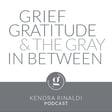
Navigating Pet Loss Grief: Honoring Our Beloved Animals with Beth Bigler
Beth Bigler is a Pet Loss Grief Counselor, end-of-life animal companion doula, and pet chaplain. She works with individuals and families before, during, and after the loss of their beloved animal companion. She’s also known for her Instagram account @honoringouranimals where she shares daily original content and tips about pet loss grief which are a unique blend of tools, compassion, and “telling it like it is.” She works closely with animal care workers, veterinary professionals, and other pet industry brands on grief training and awareness. She is a regular contributor to podcasts, articles, and other media. Her debut book, Honoring Our Animals: 365 Meditations for Healing After Pet Loss is published by Quarto Books. Beth is also a seasoned film/television professional, college instructor, and mom to a five-year-old son and two divine felines!
The best way to learn about Beth is through her Instagram @honoringouranimals or website: www.honoringouranimals.com
Other podcast episode with Beth
Recommended Pet Loss Books For Kids 6 and Under
Find Momo Everywhere by Andrew Knapp
Remembering by Xelena Gonzalez
The Tenth Good Thing About Barney by Judith Viorst
The Invisible Leash by Patrice Karst
Remembering Blue Fish (Daniel Tiger) by Becky Friedman
Show Highlights:
•Beth Bigler, a certified pet loss grief counselor, explains why pet loss is often a "disenfranchised grief," lacking societal acknowledgment despite being as intense, or even more profound, than human loss due to disrupted routines and deep emotional bonds.
•Gain insight into compassionate euthanasia, understanding it as a medical decision to ensure a "good death" for beloved pets, emphasizing dignity and avoiding suffering.
•Discover practical tools and strategies for coping with grief, including managing guilt and "what ifs," and developing self-compassion, noting how these skills are foundational life tools applicable to all major life events..
•Learn valuable tips for parents on supporting children through pet loss, advocating for honest, age-appropriate language, recognizing that children grieve in spurts, and involving them in memorializing rituals.
•Explore Beth's new book, "Honoring Our Animals: 365 Meditations for Healing After Loss," a practical resource offering daily guidance on coping, identity, and maintaining connection with beloved pets.
•Understand the power of maintaining daily rituals with your beloved, like greeting their photo, to comfort your brain and foster a sense of continuity after physical absence.
•Reflect on "anticipatory grief" and the concept that "your goodbye begins on day one," encouraging gratitude for every moment spent with your beloved animal.
Connect with Kendra Rinaldi at https://www.griefgratitudeandthegrayinbetween.com/


